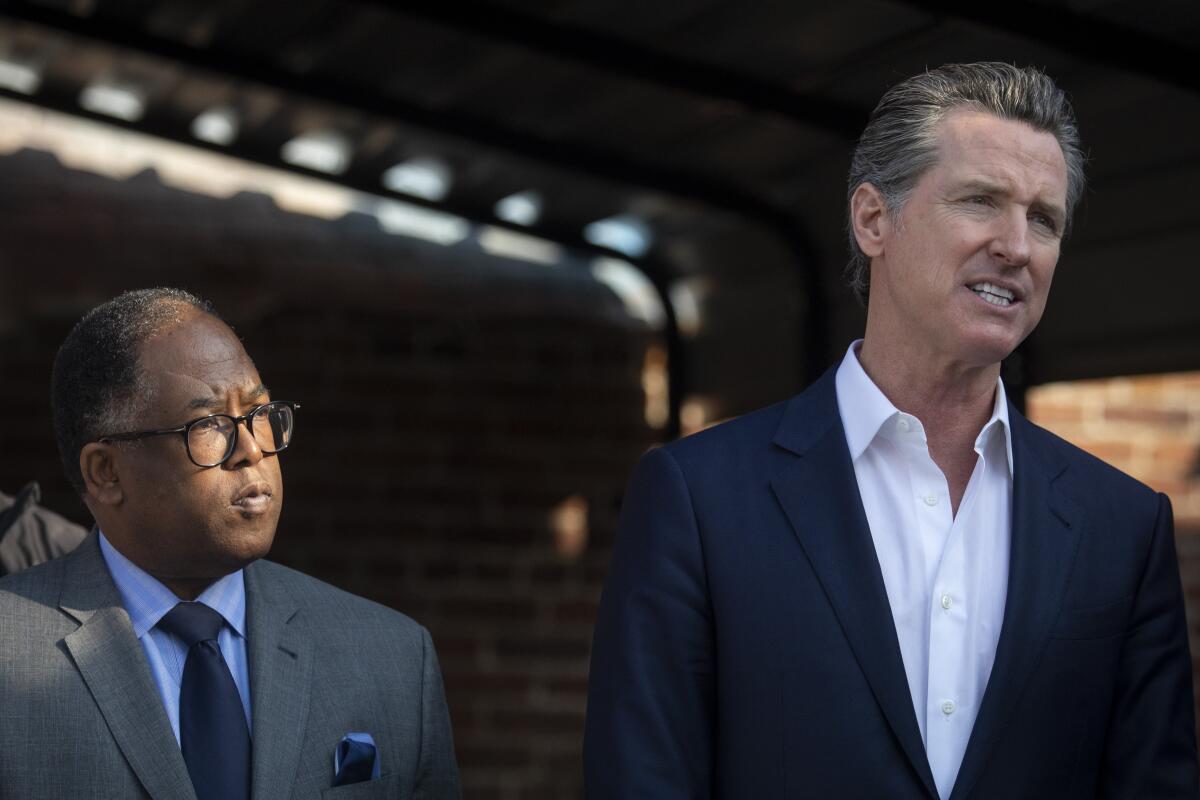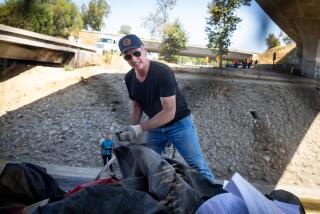Gov. Gavin Newsom promotes using state-owned trailers to house homeless people

- Share via
Gov. Gavin Newsom repeatedly promoted a temporary solution to California’s most visible problem this week during a tour on homelessness that began at a shelter in the Sierra foothills and ended in a vacant city-owned lot in the shadow of the Oakland Coliseum: The state would dispatch 100 travel trailers to provide immediate shelter.
Newsom and his aides publicized their plan again Thursday, posting a video on social media showcasing a caravan of 15 trailers traveling down the highway toward the Bay Area, where the shelters were on display for a news conference.
“We need to tackle the issue of homelessness head on,” the governor tweeted. “Eight days ago, I issued an executive order to rapidly increase housing and shelter options across CA. Just a few days later, we’re deploying trailers to communities in need to provide services & shelter.”
“California is responding to a crisis,” tweeted Jason Elliott, Newsom’s senior counselor for housing and homelessness.
Standing next to the governor on Thursday, Oakland Mayor Libby Schaaf announced that the 15 trailers would house 50 to 70 people in her city. But with federal estimates suggesting more than 150,000 Californians lack permanent housing — with more than 100,000 living outdoors or in their cars — 100 trailers would fail to help even 1% of the population in need across the state.
“On one hand, it’s a little bit of a publicity stunt, but on the other hand, it’s evidence that someone is finally paying attention to this,” said Steven Maviglio, a Democratic strategist and former communications director for Gov. Gray Davis. “Does it solve the problem? No. Is it a start? Yes.”
While their benefits will be limited, the trailers are symbolic of the public pressure Newsom faces to address homelessness, motivating the governor to show he’s trying to tackle the problem — a top-of-mind concern to California voters — with a sense of urgency, Maviglio said.
A poll released by the nonpartisan Public Policy Institute of California this week found that 23% of likely voters considered homelessness the most important issue for Newsom and the Legislature in 2020, followed by housing costs and availability at 11%.
“This is something the state can do right now, today, to help members of the public,” said Brian Ferguson, a spokesman at the Governor’s Office of Emergency Services, who said the trailers were sent to Oakland from Butte County, where state workers were using them in response to the Camp fire.
Rob Stutzman, a Republican consultant and former communications director to Gov. Arnold Schwarzenegger, said he doesn’t fault Newsom for using the trailers to show action on homelessness, which is difficult to do by touting wonky spending proposals and policy changes.
“There are no pictures of that,” Stutzman said. “It’s hard to demonstrate to voters that ‘I get it, something needs to be done and I’m doing something.’ This at least presents a visual of something tangible that demonstrates he is doing something, but you have to be careful not to somehow oversell to voters that he thinks this is an actual solution.”
Newsom told reporters that he recognized the trailers didn’t offer a permanent resolution to the problem.
“This is a deeply temporary solution to the crisis at hand,” he said. “No one is in denial about the scale and scope of the crisis, either, and none of us are naive that 15 trailers … is going to solve the crisis. It’s about catalyzing a focus, catalyzing investment and beginning to leverage our resources and resourcefulness to meet this moment head-on.”
The governor has described the trailers and dozens of tents he intends to deploy as a way to establish triage centers for state, local and social service groups to connect with the homeless population in different communities and offer assistance.
Newsom’s staff provided few details in response to questions about the deployment of all 100 trailers, which they said would be made available by the end of March. It has not been determined which communities will receive them. The governor’s office anticipates that up to 11 people could fit in each trailer and said it will be up to local governments to decide what to do with them, including whether the trailers will be connected to electricity or water.
The plan is just one example of efforts Newsom included in his proposal to spend $1.4 billion on homelessness in the new state budget. The governor called for allocating $750 million to a new California Access to Housing and Services Fund to support rent subsidies and develop affordable units to provide more stable housing options. Kaiser Permanente announced Friday that it would donate an additional $25 million the fund, which Newsom set up as a public-private partnership.
If approved by the Legislature, the funding would follow a plan to provide $650 million to communities this year to address homelessness. Through executive order, the governor has also tasked his administration with identifying excess state land and property that could be used for short-term emergency shelters.
Stutzman said Newsom’s ability to solve or at least stem homelessness could define his administration. For better or worse, the governor has publicly acknowledged that he owns the problem.
“We’ve seen public polling that shows this is an increasing crisis in the minds of voters and it cuts across ideological spectrums,” Stutzman said. “The risk is that if there’s a public health crisis that comes out of this, or if the problem continues to grow at a substantial volume, then he could end up being defined by this crisis, which is uniquely pronounced in California.”
More to Read
Sign up for Essential California
The most important California stories and recommendations in your inbox every morning.
You may occasionally receive promotional content from the Los Angeles Times.











